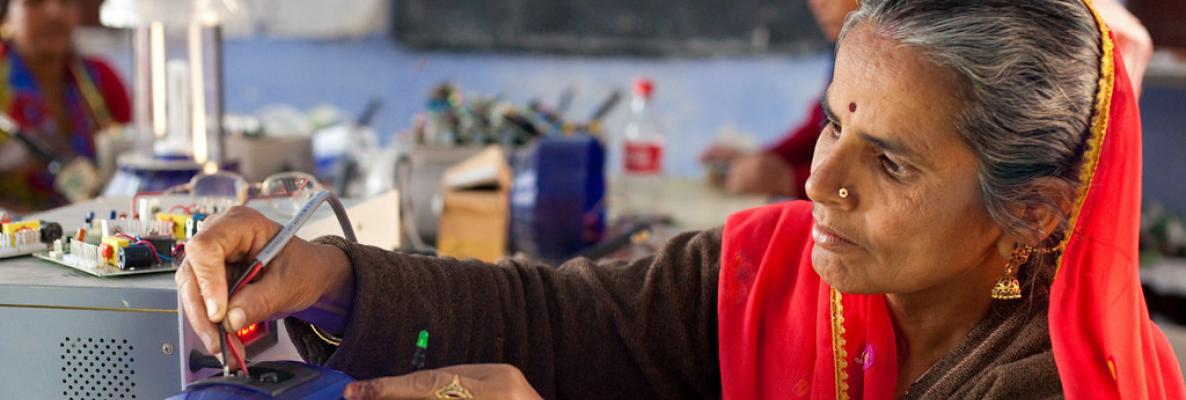Gender Balance and Climate Change Inextricably Linked
- Author(s): UN Climate Change News

UN Climate Speech / 23 Mar, 2022
UN Climate Change News, 23 March 2022 – In an address today to the Global Peace and Prosperity Forum, UN Climate Change Executive Secretary Patricia Espinosa underlined the crucial role of women in tackling climate change and the need for gender balance in the international climate change process.
While humanity has made considerable progress towards international peace and prosperity, the world still faces major challenges, not least addressing rapidly advancing climate change, which the UN Climate Chief called “an existential emergency unprecedented in modern times.”
Describing climate change and gender equality as being “inextricably linked,” she stressed the need to address both holistically.
“Half-measures will not help us deal with climate change, nor will only including half the global population,” she said.
The science clearly lays out the goals the international community must achieve to tackle the climate crisis: Reduce emissions by 45% by the end of this decade; achieve climate neutrality by mid-century; limit global temperature rise to 1.5C by the end of the century. To help meet these goals, Ms. Espinosa called for greater representation of women in leadership at all levels in both the private and public sectors.
The UN Climate Change process is country-driven and countries themselves decide who is represented in their national delegation. Governments adopted a goal of gender balance in national delegations and in national climate policy and action in 2012, yet while some progress has been made, it falls far short of reaching the target set.
This under-representation of women often reflects what is happening at national and local levels. Ms. Espinosa said it was now time for countries to explain exactly how they seek to achieve gender parity in local, national, and international climate policy and decision-making roles.
“We have got to get beyond these very general statements that they will “continue to strive for equal representation” and see more “here’s exactly how we will achieve it and here’s when,” Ms. Espinosa said.
On a positive note, she highlighted that there have been some success stories and urged the international community to seek inspiration from best practices in other sectors, countries, or businesses where gender equality and women’s and girls’ empowerment have advanced and concrete measures have been put in place. These include a written policy, formal targets or quotas, and performance indicators for senior leaders.
See full statement below:
It’s a pleasure to be here.
Global Peace and prosperity are the topics of this particular forum and represent our elusive human endeavor.
Humanity is a species with unlimited potential to achieve incredible progress in innumerable areas but we often become our own worst enemies with respect to achieving that progress.
We have dramatically reduced extreme poverty globally in the last half-century. Millions have achieved higher standards of living. Technology has advanced at incredible rates. We have had periods of relative peace and, for some, reasonable prosperity.
Yet our instincts often overcome our better judgments. War instead of peace. Separation instead of equality. Judgment instead of compassion.
Great challenges face us today, as they always have. This includes direct conflicts between nations which, as they always do, set back gender equality gains while having a devastating impact on populations.
Beyond those immediate challenges, however, is the specter of climate change — an existential emergency unprecedented in modern times. We are tasked with the global challenge of addressing rapidly advancing climate change — a challenge for which humanity bears responsibility.
A threat multiplier, climate change exacerbates most challenges humanity faces, ranging from security, poverty, justice, equality, and more.
The science clearly lays out the goals we must achieve. We must: reduce emissions by 45 percent by the end of this decade; achieve climate neutrality by mid-century, and limit global temperature rise to 1.5C by the end of the century.
Let me outline the challenge from the UN Climate Change perspective and how we are trying to move forward.
The UNFCCC is a country-driven process and countries have sole discretion as to who is represented in their national delegation.
So we see that the representation of women is often reflective of what is happening at national and local levels.
Parties to the UNFCCC adopted a goal of gender balance in national delegations and in national climate policy and action in 2012.
And since then, the Secretariat has reported annually on the gender composition of national delegations and policy and decision-making bodies under the UNFCCC and subsequently, the Paris Agreement.
There have also been technical reports and other measures taken at the international level to highlight the overrepresentation of men in the international climate process.
We have seen some progress. But let me be blunt with you — what I see is disappointing.
A case in point was the recent COP26 climate negotiations in Glasgow.
I couldn’t help but think, as I looked beside me on the podium during the final plenary discussions in Glasgow: where were all the other women?
It was similar when I looked into the audience. I saw many women, but I knew that only 1/3rd of them were lead negotiators.
Yet there was a different picture available — one taken on women’s leadership day. I was part of it. There was a moment when all-female leaders got together for a group photo. It was truly remarkable. I joined other women leaders such as Theresa Ribera, Mary Robinson, Nicola Sturgeon — and these were only a few examples of so many.
It’s time the two pictures matched: the one at the final plenary and the picture on women’s leadership day. And it’s time we saw more women in leadership at all levels and in both the private and public sectors. It’s 2021, not 1821.
To be clear: this is not the job of women alone. It’s why I will, in addition to the formal process, continue to call upon those in positions of power to step up, take notice and facilitate opportunities for talented, skilled women and girls – in all their diversity – to lead.
It’s time for countries to be deliberate in how they seek to achieve gender parity in local, national and international climate policy and decision-making roles.
We have got to get beyond these very general statements that they will “continue to strive for equal representation” and see more “here’s exactly how we will achieve it and here’s when.”
Let’s be clear that no country has yet achieved gender equality. The same applies to many corporations and businesses. More — much more — work remains.
Yet there have been some success stories. We must look to best practices in other sectors, countries or businesses where gender equality and women’s and girls’ empowerment has advanced and concrete measures have been put in place.
Measures might include a written policy, formal targets or quotas, performance indicators for senior leaders and most likely a combination of measures is required.
Friends,
My message to you is this: it is critical to address gender equality and climate change holistically because they are inextricably linked.
If we can get it right, we have an incredible opportunity to effect incredible change — and that includes finding lasting peace.
Progress is possible — I’ve seen it in my lifetime.
I remember the first World Conference of the International Women’s Year in Mexico City back in 1975.
I was proud of my city for hosting the event, and while I knew we had so far to go on gender issues, it was remarkable that the need for work was finally being undertaken at a higher level.
Imagine my honor then, when I was at the Mexican mission in New York two decades later, to have the chance to be part of the team leading discussions at the conference in Beijing in 1995.
The results from that conference have reverberated internationally, were reflected in the Paris Agreement, and led to some greater inclusion. I wish I could tell you it was comprehensive and fast-moving.
But the point is that we continue to move forward and that we continue to make progress. Our work is never in vain.
We face a monumental struggle in difficult times. But we will and must get through this. Half-measures will not help us deal with climate change, nor will only include half the global population.
We can and must do better. I thank you for participating in this event and I look forward to working with all of you toward our everlasting objective: achieving peace and prosperity for all people.
- Source Website: https://unfccc.int/news/gender-balance-and-climate-change-inextricably-linked
- Highlight of the_news: Climate, Gender

